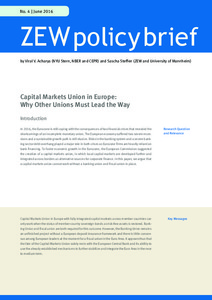Capital markets union in Europe: why other unions must lead the way

Zentrum für Europäische Wirtschaftsforschung, Mannheim
ZEW - Mannheim
2016
7 p.
banking ; capital resources ; economic recession ; EMU
Policy brief
16-04
EMU and International monetary system
English
Bibliogr.
"In 2016, the Eurozone is still coping with the consequences of two financial crises that revealed the shortcomings of an incomplete monetary union. The European economy suffered two severe recessions and a sustainable growth path is still elusive. Risks in the banking system and a severe banking sector debt-overhang played a major role in both crises as Eurozone firms are heavily reliant on bank financing. To foster economic growth in the Eurozone, the European Commission suggested the creation of a capital markets union, in which local capital markets are developed further and integrated across borders as alternative sources for corporate finance. In this paper, we argue that a capital markets union cannot work without a banking union and fiscal union in place."
Digital
The ETUI is co-funded by the European Union. Views and opinions expressed are however those of the author(s) only and do not necessarily reflect those of the European Union or the ETUI.